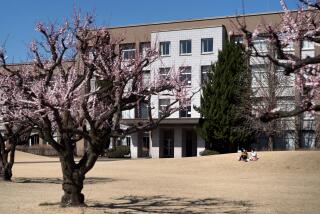Perception Gap Hurts U.S. and Japan
- Share via
TOKYO — Every time I leave Japan on business--which is about once a month--I am struck by the huge gap in perception about the state of the Japanese economy between those who live in Japan and those who observe it from the outside.
The U.S. and European media are replete with reporting about the impending collapse of the Japanese economy. As one senior U.S. government official recently asked his Japanese counterparts, “Your economy is falling apart. Why aren’t you urgently doing something about it?’
Similar concerns have been raised by American business leaders. At the U.S.-Japan Business Council meetings this year, Americans expressed frustration that Japanese leaders seemed reluctant for their country to take responsibility, as the world’s second largest economy, to be an “engine of growth” for Asia and to take immediate action to prevent a worldwide depression.
For most Japanese, all this is alarmist nonsense. While acknowledging the twin problems of nonperforming loans in the banking sector and the longest recession in the postwar period, most Japanese are confident that their problems can be surmounted over time, just as Japan overcame the Nixon-imposed shock of 1971 (when the yen went from 360 yen per dollar to floating exchange rates), the oil crises of 1973 and ’79 and the Plaza Accord of 1985 (when the yen nearly doubled in value).
Why this huge perception gap? At least six reasons come to mind.
* Outsiders tend to evaluate the Japanese economy by analyzing data: the negative growth for three successive quarters, highest unemployment rate since the 1950s, at least $600 billion in nonperforming loans, etc. But for most Japanese, the economic downturn has resulted in only a marginal decline in living standards.
* Outsiders have focused attention on Japan’s financial problems while overlooking its manufacturing prowess. The declines in demand domestically and in Asia have hit the income of many Japanese manufacturers, but their cost reduction efforts will result in greater competitiveness once demand picks up. Even with the recent volatility in exchange rates, if the yen remains at anything more than 100 per dollar, most exporters will continue to make handsome profits.
* Many outside observers lump Japan’s problems into “Asia’s financial crisis” and assume that economic conditions in Tokyo are similar to those in Seoul, Jakarta or Bangkok. This misses the fact that Japan constitutes 70% of the East Asian economy and its economy is seven times the size of China’s, 10 times Korea’s, 20 times Indonesia’s and 53 times Thailand’s. Japan is endowed with world-class technology, a highly skilled work force, a $130-billion current account surplus and $240 billion in foreign currency reserves.
* There is a sense of triumphalism and Schadenfreude in the U.S. rooted in the “industrial policy” debates of the 1980s. Economists who had difficulty then explaining Japan’s economic successes find it convenient to dismiss Japan’s current problems as a result of “crony capitalism” and “government intervention” without examining those elements of the Japanese system that continue to sustain Japan’s strengths.
* The negative economic news reported by the Japanese media is often translated into English by the Western media without providing proper context. A recent example is the inordinate attention in the Western media to instances of suicide in Japan. While there have been some highly publicized cases of suicide among owners of bankrupt small and medium-sized companies, these are hardly representative of the business community or society.
* Finally, there is Japan’s well-known inability or unwillingness to explain itself to the outside world. Whether in casual conversations with outsiders or in formal presentations at international conferences, Japanese are rarely articulate, logical and persuasive by Western standards in explaining their situation accurately. In fact, some Japanese have said privately that given the choice of being viewed as a strong economic competitor or as an economy in decline, they prefer the latter because it would blunt scrutiny and criticism of Japan.
Whatever the reasons, the perception gap explains in part why mutual frustration is likely to grow between Japan and the outside world. Outsiders need to walk a fine line as they continue to raise concerns about and offer proposals on how to remedy Japan’s economic problems. Don’t exaggerate Japan’s fragility, don’t underestimate its strengths and, above all, understand accurately both Japanese self-perceptions and what is happening in Japan so that serious proposals for reform will have a chance to be heard, accepted and acted upon.
More to Read
Inside the business of entertainment
The Wide Shot brings you news, analysis and insights on everything from streaming wars to production — and what it all means for the future.
You may occasionally receive promotional content from the Los Angeles Times.










